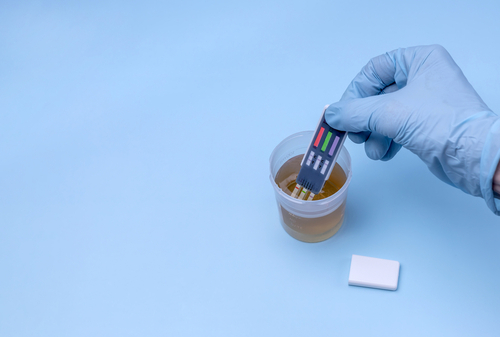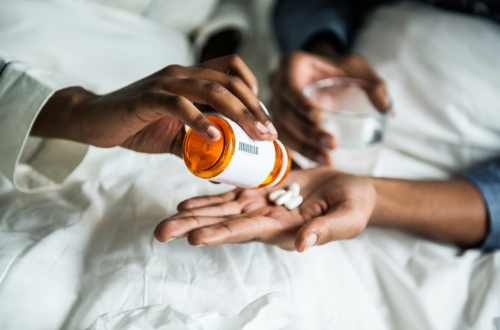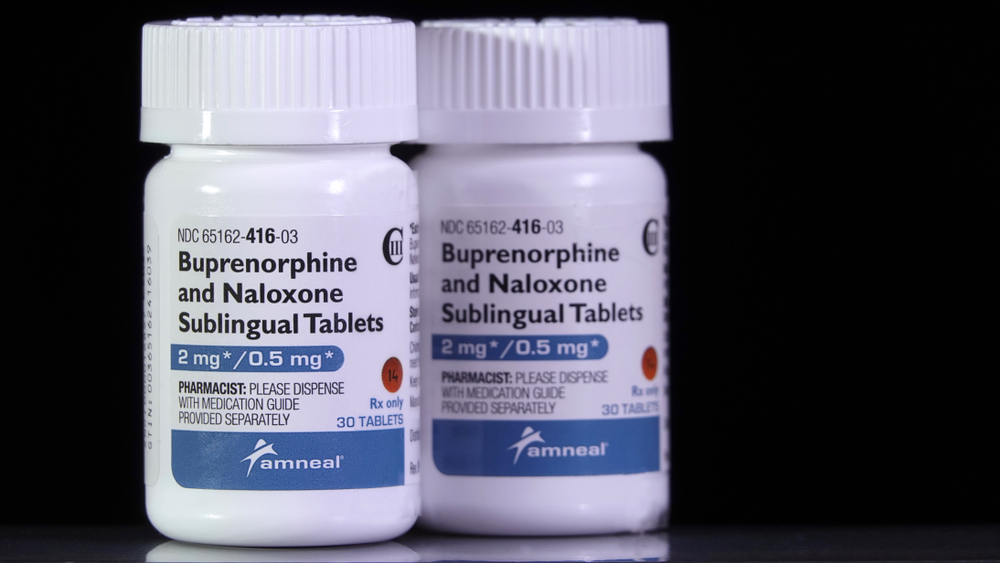While Suboxone is an effective way to treat opioid addiction and withdrawals, it’s important to understand how long it stays in your system and how it interacts with other medications. In this article, we’ll discuss the different ways Suboxone can be detected in the body, including urine, saliva, blood, and hair.
We’ll also explore the half-life of Suboxone and how it compares to other medications like methadone. Additionally, we’ll discuss how to get Suboxone and whether it’s possible to develop an addiction to it.
What Is Suboxone?
Suboxone is a medication that is utilized for the treatment of opioid addiction. It’s made of two primary active ingredients, buprenorphine and naloxone.
Buprenorphine functions as a partial opioid agonist that reduces withdrawal symptoms and cravings in individuals with opioid addiction.
Naloxone acts as an opioid antagonist that blocks the effects of opioids, and it is added to Suboxone to prevent its misuse. When used correctly, the naloxone in Suboxone has no effect. However, if Suboxone is crushed and injected, the naloxone will neutralize the effects of the buprenorphine, causing withdrawal symptoms.
Overall, Suboxone can reduce withdrawal symptoms and cravings while also deterring misuse through its buprenorphine and naloxone components.
How Does Suboxone Counter Opioids?
Suboxone binds to the G protein-coupled receptors (GPCRs), the same receptors in the brain affected by opioids, but to a lesser degree. This activates the receptors enough to reduce withdrawal symptoms and cravings without producing the euphoric effects of full opioid agonists like heroin or oxycodone.
Additionally, buprenorphine has a longer half-life than many other opioids, which means it remains active in the body for longer. This allows for less frequent dosing, reducing the risk of withdrawal symptoms and cravings between doses.

How Long Does Suboxone Stay In Your System?
Urine: Suboxone can be detected in urine for 2-4 days after the last dose. However, this can vary depending on the individual’s metabolism and dose.
Saliva: Suboxone can be detected in saliva for up to 1-4 days after the last dose, although this can also vary based on individual factors.
Blood: Suboxone can be detected in blood for up to 24 hours after the last use.
Hair: Suboxone can be detected in hair samples up to 90 days after the last dose, although this can vary depending on factors such as hair length and growth rate.
Factors That Influence Suboxone’s Detection Window
Body fat and other factors can affect how long Suboxone stays in your system. Here are some examples:
Body fat: Suboxone is lipophilic, meaning it is soluble in fat. This means that if you have a higher percentage of body fat, Suboxone can stay in your system for longer periods. Suboxone may also accumulate in fatty tissues, which can slow down its elimination from the body.
Metabolism: People with faster metabolisms may eliminate Suboxone’s metabolites more quickly than those with slower metabolisms.
Dose of Suboxone: Higher doses of Suboxone may stay in the body longer than lower doses, as they take longer to metabolize.
Frequency of use: If you’ve been taking Suboxone for a long time, it may take longer for the medication to clear your system, as it can build up in your system.
Route of administration: For example, injecting Suboxone can result in a more rapid onset of effects and a shorter duration of action than taking it orally.

How Long Do The Effects Of Suboxone Last?
Suboxone is a long-acting medication designed to be taken once or every other day, depending on the individual’s treatment plan. Buprenorphine is primarily metabolized and eliminated through the urine and feces, while naloxone is metabolized by the liver and excreted through the urine. In individuals with moderate to severe liver disease, the half-life of both buprenorphine and naloxone can be significantly prolonged, with naloxone being affected more than buprenorphine.
Here are some general guidelines on how long the effects of Suboxone can last:
Onset: The effects of Suboxone typically begin within 30 minutes to an hour of taking the medication.
Peak effects: The peak effects of Suboxone are usually felt within 1-4 hours after taking the medication.
Duration: The effects of Suboxone can last for up to 24 hours or more, depending on the dose taken and individual factors.
Is Suboxone Long Or Short-Term?
Suboxone is typically used as a long-term treatment for opioid addiction and is usually part of a comprehensive treatment plan that may include counseling, behavioral therapy, and other support services. The duration of Suboxone treatment can vary depending on the individual’s needs and treatment plan. Some people may use Suboxone for several months or years, while others may continue to take the medication indefinitely.

What Is The Half-Life Of Suboxone?
Suboxone has a half-life that varies between 24 to 42 hours. For instance, if someone ingests a Suboxone dose with a half-life of 24 hours, 50% of the dose will be eliminated after 24 hours. After another 24 hours, 50% of the remaining amount will be metabolized, eliminated, and so forth.
In cases of moderate liver impairment, the half-life of buprenorphine can increase by 35%, while the half-life of naloxone can increase by 165%. In severe liver impairment, the half-life of buprenorphine can increase by 57%, while the half-life of naloxone can increase by 122%.
How Does Suboxone Work With Other Medications?
Always inform your healthcare provider about your current medications before starting Suboxone treatment.
Benzodiazepines: Combining benzodiazepines with Suboxone can heighten the risk of respiratory depression, which can be fatal.
Opioids: Taking other opioids with Suboxone can decrease the medication’s effectiveness and increase the chance of adverse effects.
Certain antidepressants: Taking specific antidepressants with Suboxone can elevate the risk of serotonin syndrome, a severe condition that arises when there is too much serotonin in the body.
Some antipsychotic medications: Taking Suboxone with specific antipsychotic medications can amplify the risk of QT prolongation, a condition that causes irregular heartbeats. QT stands for the QT interval, which measures the heart’s electrical activity and represents the time it takes for the heart to contract and then relax.

Suboxone Vs. Methadone
Suboxone and methadone are both effective medications used to treat opioid addiction. Here are some differences between the two:
Active ingredients: Suboxone contains buprenorphine and naloxone, while methadone contains only methadone. All three components are synthetic medications derived from naturally occurring compounds.
Administration: Suboxone is available as a sublingual tablet or film that dissolves under the tongue, while methadone is usually given as a liquid that is consumed orally.
Legal status: Methadone is a Schedule II controlled substance and Suboxone is a Schedule III controlled substance and can be prescribed by qualified healthcare providers.
Duration of action: Methadone has a longer half-life than Suboxone, which means it stays in the body longer and can help manage cravings and withdrawal symptoms for a longer time.
How To Get Suboxone
Suboxone requires a prescription from a healthcare provider or addiction treatment specialist. To start Suboxone treatment, you should first consult with an authorized provider who will assess your medical history and determine if Suboxone is appropriate for you. If it is, your provider will prescribe the medication and guide you through the process of obtaining it from a pharmacy. It’s important to note that Suboxone treatment is usually included in medication-assisted treatment combined with counseling and behavioral therapy.
Can You Develop A Suboxone Addiction?
Yes, it is possible to develop a Suboxone addiction. While Suboxone is a medication-assisted treatment for opioid use disorder, it does contain buprenorphine, an opioid. Buprenorphine can produce physical dependence, and people who use it long-term or abuse it can become addicted.
However, when taken as prescribed under medical supervision, the risk of addiction to Suboxone is significantly lower than the risk of addiction to other opioids like heroin or prescription painkillers.
Contact MD Home Detox
If you or someone you know is struggling with opioid addiction and want to know more about addiction treatment and Suboxone, contact MD Home Detox. We are the first individualized concierge recovery program in the US to offer at-home detox services. Our drug and alcohol recovery program provides a comprehensive and fully-integrated team treatment approach designed specifically for the home environment.

